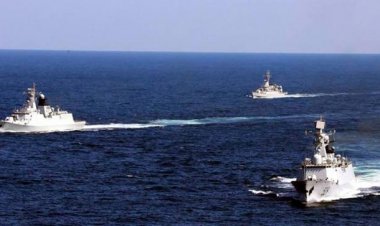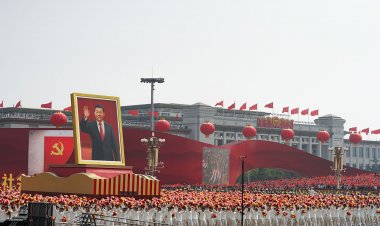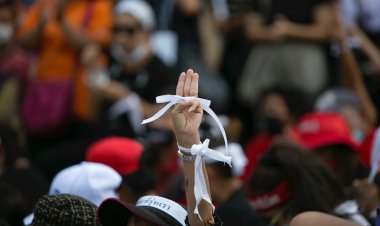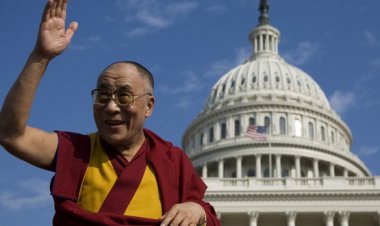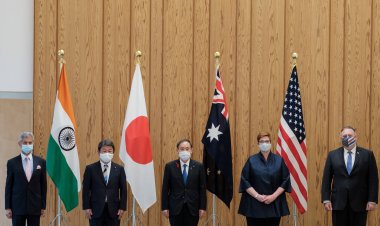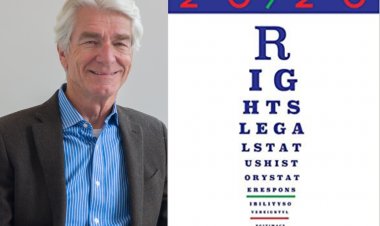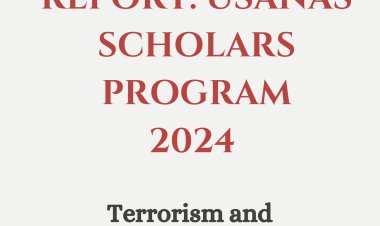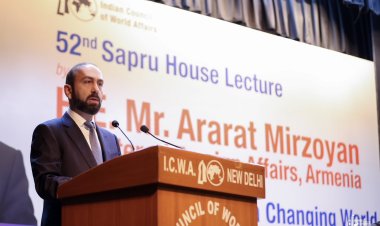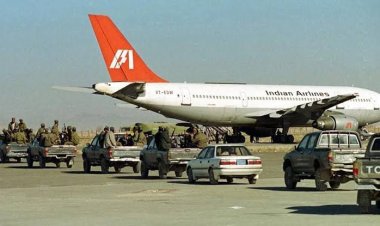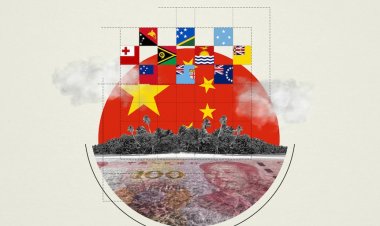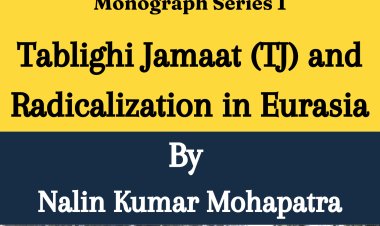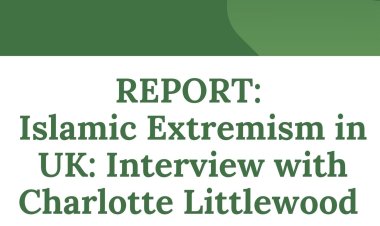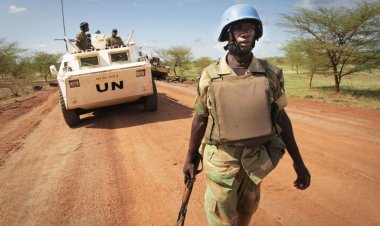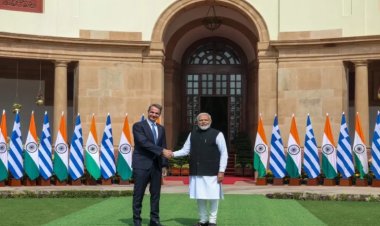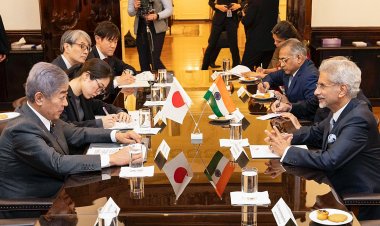Exclusive Interview with Ms Cleo Paskal
Usanas Foundation brings you an exclusive interview with Ms Cleo Paskal as part of our new 'Quad and Quad Plus Dialogues'.
Usanas Editorial Team
Usanas Foundation had a timely interview with Dr Cleo Paskal on a host of crucial issues concerning the Indo-pacific. The interview was conducted by Rushali Shah and highlighted the multifaceted implications of the current crises in Afghanistan. During the interview, Cleo underlined the receding image of the U.S. in the Indo-Pacific and the multi-scale vitality of India in the Indo-Pacific century. Cleo also discussed the prospect of the Quad plus arrangement to make it more inclusive and analyzed the involvement of extra-regional powers in the region.
Cleo is an associate fellow in Energy, Environment, and Resources program and the Asia-Pacific program at Chatham House. She also has associations with several well-known governmental and non-governmental organizations across the globe. She particularly specializes in Indo-Pacific affairs and is also the research lead on Chatham House’s project on perceptions of strategic shifts in the Indo-Pacific,
She is also a distinguished author and contributor to several books and has published widely in globally reputed academic and popular media spaces. She also has more than two dozen awards for published written work and she is also the writer of a 13-part Emmy-winning TV documentary series. She actively engages in a public commentary in her domain of expertise and provides crucial insights on a wide range of issues in the Indo-Pacific region.
The transcript of the interview is as follows;
Rushali Saha (RS): It is only fair that we begin by addressing the situation, the current moment of history we are living in and the unfortunate humanitarian disaster which is taking place in Afghanistan. So, in your opinion, how do you see what is unravelling in Afghanistan impacting the South Asian region and the Indo-Pacific region at large?
Cleo Paskal (CP): It is an inconceivable heartbreaking, avoidable tragedy what’s going on. It’s actually hard to really comprehend how quickly it has become so bad and it’s also hard to know how it’s going to evolve. There are some things which are very clear. One is, the U.S. has lost legitimacy as a security partner in a way that is “cataclysmic”. And this has nothing to do obviously with men and women who are in the country for 20 years and trying their best and all that sort of stuff. It very much has to do with the way this departure was managed and the last few months leading to this departure. In June, the U.S. embassy was flying pride flags for the gay community, and all that did was, it encourages people to come out of hiding so that it’s not easier to be targeted and killed by the Taliban. So, the level of betrayal not only of the country but also the value that the U.S. is presenting to the world is on display for everybody to see. It’s not the American people, it’s not the rank and file. But this leadership clearly is not a reliable security partner.
So, that has a lot of implications for the Quad and the Indo-Pacific at large. What we are also seeing obviously is China trying to rush into that security vacuum and that will undoubtedly pull it even closer to Pakistan and very unpleasant elements and those fighters. If nothing happens in Afghanistan and if there isn’t a push back within the country, and those Taliban fighters are contained within Afghanistan, then they will likely to be redirected towards India via Pakistan with Chinese support. Because, in the context of the Indo-Pacific and the Quad, the second biggest threat to China after the U.S., which is now being terribly weakened, is India. India is an existential threat to China in many ways.
First of all, it’s a democracy of a billion people. So, it undercuts the Chinese Communist Party rationale that says that only an authoritarian, or in fact fascist dictatorship, can control a billion people well. You know India is doing just fine next door. Also, India is in a position to take some of the supply chains that are being redirected out of China. India is a pluralistic society. It’s not building concentration camps for religious minorities, unlike China. So, India is very much just by its mere existence a threat to the rationale of the existence of the Chinese Communist Party. And as the Chinese Communist Party and the PLA get pulled in by Pakistan into Afghanistan, then I would expect that it would increasingly try to use those proxies to go after India.
So, it’s cascading catastrophe potentially and the implications are far beyond that geographic area. Because if you look at other Indo-Pacific security partners of the U.S., like Japan for example, at this point Japan must be thinking, ‘we better get some nuclear weapons really fast’. Australia, which has been doing an excellent job standing up to China must also be wondering what kind of backing it will have. The Philippines must too. So, in that context, India becomes more important as a potential security partner to all of those other Indo-Pacific allies that are more concerned about the U.S.
So, if you are starting to get a kind of fragmentation between China and the free world, the free world is not necessarily coalescing around the US at this moment in time. And the question is, whether India can create a third way that can help Coalesce for that. So, the implications are enormous and it’s a very very difficult time in history.
RS: I would like you to elaborate on what you spoke about how China is getting in to fill this vacuum. So, what do you see the future role of China being in the Indo-Pacific and how do you see the China-US competition playing out in the region? Would it be a decisive force in shaping the regional order?
CP: China, I would expect! Again, so we are in this really-really volatile time. But if China sees what is happening in Afghanistan as a weakness on part of the U.S…. We saw what happened with Covid, as soon as it (China) saw weakness in the area, it pushed harder. So, if it sees the Afghan collapse as another moment of weakness, then I would expect it to start ramping up activities directly. The U.S. administration that’s in place now, given what just happened in Afghanistan, doesn’t look like the U.S. administration that would back up the Senkaku’s for Japan or would back up Taiwan. It doesn’t look like that it makes those decisions. So, China has a habit of trying to push up where the red line is. And what we are seeing happening now, I would be hard press to know what will be the red line of this administration. I don’t know at what point they would act. I just don’t know. You know I am not a genius; I don’t have special knowledge. But there must be a lot of people feeling the same that I do and that’s not a good position for the world to be in.
So again, that put a lot of weight on India. Because if Taiwan is threatened and China invades it, once that is secured, they are coming after the Himalayas next. Right! So Indian strategic community is very clear that its security is tied to what’s going in the maritime domain and the Indo-Pacific. That’s the whole rationale part for the Quad. So, the pressure on India to start to, which it already has, but even more so to take some of this burden is increasing. The country already has a lot of challenges and the responsibility of the government. People need jobs you know, people need vaccines. It’s not as if India doesn’t have enough challenges already apart from saving the world. But at this point, given your question on Chinese activity, India has been actually much clearer about pushing back on Chinese activity through a whole range of things – like from banning the apps, to rolling up some of the spy networks, to restricting Chinese FDI – in all of the ways that the US hasn’t done. So, I know the question was a China-U.S. question, but I think that we are in a period where the question is actually going to start to become a China-India and allies’ question.
RS: You would agree with me that for the longest time India is seen as the weakest link of the Quad, but now off course it has come to play a very prominent role. So, how do you think this current role of India in the Quad is evolving and how is it shaping the policy in the region at large?
CP: So, I would push back on India being the weakest link of the quad. I think you are asking a legitimate question; the question is fine. But there has been a very concerted effort by other countries to blame India for its lack of commitment. And we have seen this recently a lot. With Kevin Rudd for example in Australia, who’s been writing a lot of op-eds lately and he wrote a letter to the Sunday Guardian saying ‘it wasn’t me that killed the Quad the first time around’. Whereas you know we have statements from his ministers at the time saying we are not doing this, we are going to pull out. So, I think there is a lot of vested interest in other sectors to blame India for this. I think India obviously had internal restrains and all that stuff. But also, the same Australian government switched the policy on the provision of nuclear stuff for India as well. You know there are a lot of other things going on. So, you are right! That was the perception and there is a concerted effort in some quarters to maintain that as being the perception.
And I think it doesn’t serve for example to both India and also the current government of Australia, which is really standing up to China. Because by blaming it on India, it doesn’t show you how far the Australians have come in their dealing with China. So, I would like a little bit more self-reflection by those who are blaming India. And similarly, India in 2007-08, it was a different country with different circumstances. There was a different level of willingness to do defense agreements with India and it wasn’t getting the technical sharing it has now. You know, a lot of things have changed.
So, all of that aside, I think there is no Indo-Pacific without India and there is no Quad without India. I mean, you know it’s the anchor for the Indian Ocean, but it’s more than that. It’s an idea! it’s hope! It’s something that goes back to the old spice routes. India before the British, for all time, was all across the Indo-Pacific. That’s why there are Hindu temples in Bali. That’s why there is Buddhism all across the various countries in the Pacific. That’s why the Thai king’s named Rama. It’s an integral part of the region in ways that no other culture is. And you know I do a lot of work in Pacific Islands, and pacific islanders are very interested in try to engage more with India. It’s not a genetic thing. It’s just there is a comfort level, cultural compatibility, and economic compatibility.
The thing about the other three members of the Quad is that they are all western economies. They are expensive and they function on the assumption of a fairly well-funded social welfare network. So, the core economic unit in India is more the extended family. If you need school fees or something like that, there will be a cousin or uncle or whatever. The extended family is the economic welfare network right! That’s much more common in all the rest of the Indo-Pacific than what you’d find in Japan or what you’d find in the U.S., or in Australia, where you could go to the state or where you could get an interest rate of 2 or 3 per cent. You know the whole economic foundation is fundamentally different.
So, in that way, India can offer a level of economic understanding to more of the countries of the Indo-pacific that is an effective counter to the way that China comes into these countries, which is economic. So, China comes with low-cost goods and kind of retail level economics. They set up for example Chinese shops there. You’re not going to get U.S. shops, or Japanese shops, or Australian shops that can compete with them. But you can get Indian shops that compete with them. That pushes them (China) out of the economy, and if they are not in the economy, they don’t have the political and strategic leverage. So, India is indispensable!
RS: Can you tell how the Quad plus arrangement is shaping up and what are the avenues to make Quad more inclusive and mitigate the insecurities among the regional states, especially ASEAN’s fear of getting overshadowed?
CP: Especially what’s going on now with the U.S., I think within the four countries of the Quad, each of the countries has a logistics agreement with the other three countries from a military perspective. There is practical interoperability that has been developed from Malabar and things like that. It’s very difficult to integrate more into that. At this stage, it would be good if they could just be consolidated. There isn’t even a Quad headquarters. Right! So, what I would think to make more sense from an interoperability and engagement perspective is to make sure that the Quad is solid first. And you can add on individual countries for specific exercises like they did recently. You know Canada just did a Quad plus submarine hunting exercise off Guam for example. So, you bring in them for specific exercises but first consolidate those four.
At the same time, what would be very interesting to develop, and this is my idea that comes out of India, would be an Indo-Pacific charter, which is modeled on the Atlantic charter that was signed originally by the US and the UK just before the Americans entered the war in 1941, about what they thought the world should look like after the war, what the principles are. And Biden and Johnson just resigned the new Atlantic charter. But the 21st century isn’t the Atlantic century; it is the Indo-Pacific century. So, what would be interesting, especially in the context of when you are talking about ASEAN and stuff, is to have an Indo-pacific charter anchored by India and Japan, maybe supported by Australia and the US, that then these other countries can sign on to. And that would be the codification of the redlines of the expected behaviour.
So, it’s not an Asian NATO, nothing like that. But at least it could be self-supporting and it could maybe have an element like an ‘economic article five’ (like UN). So, if China is punishing Taiwan by not buying its pineapples, other countries that have signed on to the Indo-Pacific charter can prioritize Taiwanese pineapples. You know, I mean just little things like that. So, I would see two parallel tracks developing to bring in other countries. I could be wrong!
RS: How would you describe the consolidation of Indo-Pacific discourse? What is the role of extra-regional powers, especially European, in the current geopolitical environment of the region?
CP: So, as an Indian how do you feel about the Europeans coming back to the Indo-Pacific. So that’s basically how I feel. I mean the only one which is a little different is the French because you know, they have territories and they have been very supportive of India. I mean the French are the whole other category. The French operate for the French, but everybody knows that they operate for the French. And you can figure. I mean they have done much higher-level technology transfer with India and space cooperation. So, they sell submarines to India and Pakistan. You know like, they are the French! But they are physically in the region.
As for the other ones, they are realizing that the 21st century is the century of the Indo-Pacific and not the Atlantic. And it’s going to be for the countries of the region to figure out whether this is beneficial for them or not. There is no divine right of access for the Dutch into the Indo-pacific, or the Germans, or the British. It’s all about China, so we need to see how they clear up their relationship with China. Germans are pretty heavily compromised by China, so what are they gonna do when they come into the Indo-pacific. So, your answer is as better as mine.
RS: Fair enough! Fair enough! I think this aptly captures what you have been trying to tell us. And yes, I think if anything this sums up, if I may repeat you, is that this century is the Indo-pacific century. It really captures the essence of the entire interview.
Disclaimer: All opinions expressed in the webinar belong to the speakers and are not reflective of Usanas Foundation.

